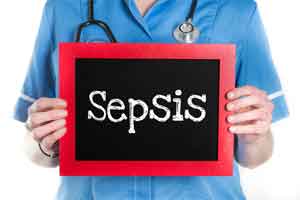- Home
- Editorial
- News
- Practice Guidelines
- Anesthesiology Guidelines
- Cancer Guidelines
- Cardiac Sciences Guidelines
- Critical Care Guidelines
- Dentistry Guidelines
- Dermatology Guidelines
- Diabetes and Endo Guidelines
- Diagnostics Guidelines
- ENT Guidelines
- Featured Practice Guidelines
- Gastroenterology Guidelines
- Geriatrics Guidelines
- Medicine Guidelines
- Nephrology Guidelines
- Neurosciences Guidelines
- Obs and Gynae Guidelines
- Ophthalmology Guidelines
- Orthopaedics Guidelines
- Paediatrics Guidelines
- Psychiatry Guidelines
- Pulmonology Guidelines
- Radiology Guidelines
- Surgery Guidelines
- Urology Guidelines
Antibiotics for Sepsis—Striking the balance

The Surviving Sepsis Campaign guidelines recommend empirical broad-spectrum therapy within one hour of triage for both sepsis and septic shock. This recommendation encourages clinicians to adopt an approach of “treat first, ask questions later” for patients with any possibility of serious infection. This approach fails to account for the difficulties clinicians face with diagnosing infection, especially when patients initially present to care, and the high rate of its overdiagnosis, and thus risks promoting the excess antibiotic use and causing unintended harm. The recommendation to treat quickly and aggressively may seem sensible because they are potentially deadly conditions.
Michael Klompas and associates provided their viewpoint published in the journal JAMA on finding an equilibrium for the use of antibiotics in sepsis. Many studies that examined quality improvement initiatives only reported outcomes for patients with a final diagnosis of sepsis and thus failed to account for its misdiagnoses at presentation and any potential harm that antibiotics might have caused in patients who were initially diagnosed with sepsis but subsequently diagnosed with other conditions.
Three key issues require consideration.
1.Diagnosing sepsis and septic shock can be challenging-
- It is arbitrary to decide whether organ dysfunction is due to infection or some other factor (eg, volume depletion, cardiomyopathy, inflammatory or autoimmune diseases, toxic ingestions, medication adverse effects, drug withdrawal). Less than 60% of patients admitted to intensive care units with a diagnosis of sepsis are confirmed to have a definite or probable infection, and of these patients, only a subset have infections caused by bacteria. Pneumonia is the most common source of sepsis, but one-third of pneumonia cases that require hospitalization are caused by viruses. Uninfected patients and patients with viral infections alone are subjected to antibiotic-related risks without any of the benefits.
2. Antibiotic use in critically ill patients can have adverse consequences-
- Withholding antibiotics from patients with serious bacterial infections can increase mortality risk, but unnecessary exposure to antibiotics, either because a patient does not have a bacterial infection or because antibiotics are continued beyond the minimum duration necessary, is also potentially harmful. Antibiotic-related risks, such as Clostridium difficile infection, acute kidney injury, hepatitis, cytopenias, severe rash, and selection for drug-resistant pathogens, have been well described, but more insidious effects, including mitochondrial toxicity and altering the microbiome, are less well appreciated.
Read Also: Smart technology to diagnose sepsis in children
3. Conflating sepsis and septic shock is a mistake-
- Time to instituting effective treatment is important for patients with septic shock, but the data are less clear for patients with possible sepsis alone who are not in shock. In a randomized trial that examined the effect of antibiotics administered in the out-of-hospital setting vs antibiotics administered in the emergency department on 2672 patients with suspected sepsis, mortality rates were the same for both groups even though the emergency department treatment group received antibiotics a median of 96 minutes after the out-of-hospital treatment group. More than 95% of patients in the study had infection alone or sepsis without septic shock, suggesting that it may be safe to take some time to gather data in cases of patients without septic shock to inform whether antibiotics are necessary.
The need to treat patients rapidly and aggressively ought to reflect on the severity of illness and certainty of diagnosis rather than applied uniformly to all patients.
- Immediate antibiotics are warranted if the patient has a shock or rapid deterioration and if there is even a small possibility that their condition is due to infection.
- If a patient does not have shock and has a lower probability of infection, then a reasonable approach may be to gather more data from biochemical tests, imaging, microbiologic and molecular assays, clinical observation, and/or speciality consultation before prescribing antimicrobials.
"In coming years, innovative technologies may help accelerate time to diagnosis and optimal treatment selection for patients with possible sepsis. Until then, studies that have documented high rates of sepsis overdiagnosis and the possibility that overtreatment may increase mortality rates compel caution", write the authors.
For reference log on to 10.1001/jama.2018.12179

Disclaimer: This site is primarily intended for healthcare professionals. Any content/information on this website does not replace the advice of medical and/or health professionals and should not be construed as medical/diagnostic advice/endorsement or prescription. Use of this site is subject to our terms of use, privacy policy, advertisement policy. © 2020 Minerva Medical Treatment Pvt Ltd